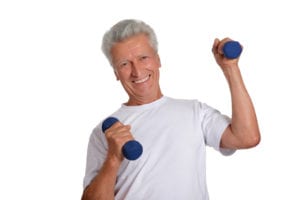Written by Angeline A. De Leon, Staff Writer. A twelve-week semi-supervised home exercise program significantly improved sleep quality and excessive day time sleepiness in the sixty-five elderly participants compared to the control group.
 Among the health issues reported by older adults, difficulty with sleep is prominent, with half of the elderly experiencing some form of sleep disorder 1. Incidence rates also appear to increase proportionally with age 2, warranting the need for more effective therapeutic approaches to treating sleep problems. In older adults, as in young, engagement in physical exercise, ranging from mild to moderate intensity, is associated with improved sleep quality 3, however, the majority of older adults face restrictions which prohibit them from participating in the same supervised exercise programs that are readily available to younger adults. Due to common issues such as difficulty with transportation and limited availability of free elderly-specific classes 4, older adults would appear to benefit most from home-based exercise programs. In fact, adherence rates to such programs are significantly greater when compared to community-based programs 5. Considering the accessibility, affordability, and convenience of home exercise for older adults, researchers in Brazil tested the feasibility and efficacy of a semi-supervised home exercise program for the elderly, examining whether an alternative to group-based physical activity could improve sleep quality in older adults suffering from sleep disorders.
Among the health issues reported by older adults, difficulty with sleep is prominent, with half of the elderly experiencing some form of sleep disorder 1. Incidence rates also appear to increase proportionally with age 2, warranting the need for more effective therapeutic approaches to treating sleep problems. In older adults, as in young, engagement in physical exercise, ranging from mild to moderate intensity, is associated with improved sleep quality 3, however, the majority of older adults face restrictions which prohibit them from participating in the same supervised exercise programs that are readily available to younger adults. Due to common issues such as difficulty with transportation and limited availability of free elderly-specific classes 4, older adults would appear to benefit most from home-based exercise programs. In fact, adherence rates to such programs are significantly greater when compared to community-based programs 5. Considering the accessibility, affordability, and convenience of home exercise for older adults, researchers in Brazil tested the feasibility and efficacy of a semi-supervised home exercise program for the elderly, examining whether an alternative to group-based physical activity could improve sleep quality in older adults suffering from sleep disorders.
In a 12-week, randomized, controlled, single-blind study 6, a total of 131 community-dwelling older adults (mean age = 68 +/- 7 years) who reported poor sleep quality and the absence of cognitive decline were recruited for participation. Before and after the intervention period, a general physical and clinical evaluation was performed to assess quality of sleep (Pittsburgh Sleep Quality Index, PSQI), excessive daytime sleepiness (Epworth Sleepiness Scale, ESS), and level of physical activity (International Physical Activity Questionnaire, IPAQ, adapted for older adults). Participants were randomly allocated to participate in the home exercise program (composed of aerobic, muscle strengthening, balance, coordination, and flexibility exercises with minimum frequency of three weekly sessions of about 40 minutes at a moderate intensity level) or a control program where they were encouraged to continue activities of daily living and follow guidelines according to their lifestyle.
All participants in the home exercise group maintained 100% adherence to the exercise program, and no exercise-related injuries were reported. Analyses revealed an apparent significant improvement in the sleep quality of the home exercise group with an average reduction of 4.9 +/- 2.7 points on overall PSQI score (p < 0.01), compared to the control group (0.7 +/- 2.8, p = 0.061). The intervention group also showed improvement on all components of the PSQI (p < 0.05). Furthermore, at the end of 12 weeks, home exercise was found to result in a significant reduction of 2.8 +/- 2.2 points on the ESS (p < 0.01).
Thus, findings of the study appear to be consistent with previous reports suggesting a link between physical activity and improved sleep quality in older adults. Successful outcomes observed in relation to home exercise also suggest that a home-based, semi-supervised format of physical activity is a feasible and effective alternative approach to promoting exercise engagement among older adults. Follow-up studies are needed to evaluate the long-term effects of such a program, using more objective measures of sleep quality.
Source: Brandao GS, Gomes G, Brandao G, et al. Home exercise improves the quality of sleep and daytime sleepiness of elderlies: a randomized controlled trial. Multidisciplinary Respiratory Medicine. 2018; 13: 2. DOI: 10.1186/s40248-017-0113-3.
© The Author(s). 2018 Creative Commons Attribution 4.0 International License (http://creativecommons.org/licenses/by/4.)
Posted March 5, 2018.
References:
- Ohayon MM, Carskadon MA, Guilleminault C, Vitiello MV. Meta-analysis of quantitative sleep parameters from childhood to old age in healthy individuals: developing normative sleep values across the human lifespan. Sleep. 2004;27(7):1255-1273.
- Crowley K. Sleep and sleep disorders in older adults. Neuropsychology review. 2011;21(1):41-53.
- Kamrani AAA, Shams A, Dehkordi PS, Mohajeri R. The effect of low and moderate intensity aerobic exercises on sleep quality in men older adults. Pakistan Journal of Medical Sciences. 2014;30(2):417.
- Nelson ME, Layne JE, Bernstein MJ, et al. The effects of multidimensional home-based exercise on functional performance in elderly people. The Journals of Gerontology Series A: Biological Sciences and Medical Sciences. 2004;59(2):M154-M160.
- Ashworth NL, Chad KE, Harrison EL, Reeder BA, Marshall SC. Home versus center based physical activity programs in older adults. The Cochrane Library. 2005.
- Brandão GS, Gomes GSBF, Brandão GS, et al. Home exercise improves the quality of sleep and daytime sleepiness of elderlies: a randomized controlled trial. Multidisciplinary Respiratory Medicine. 2018;13(1):2.

